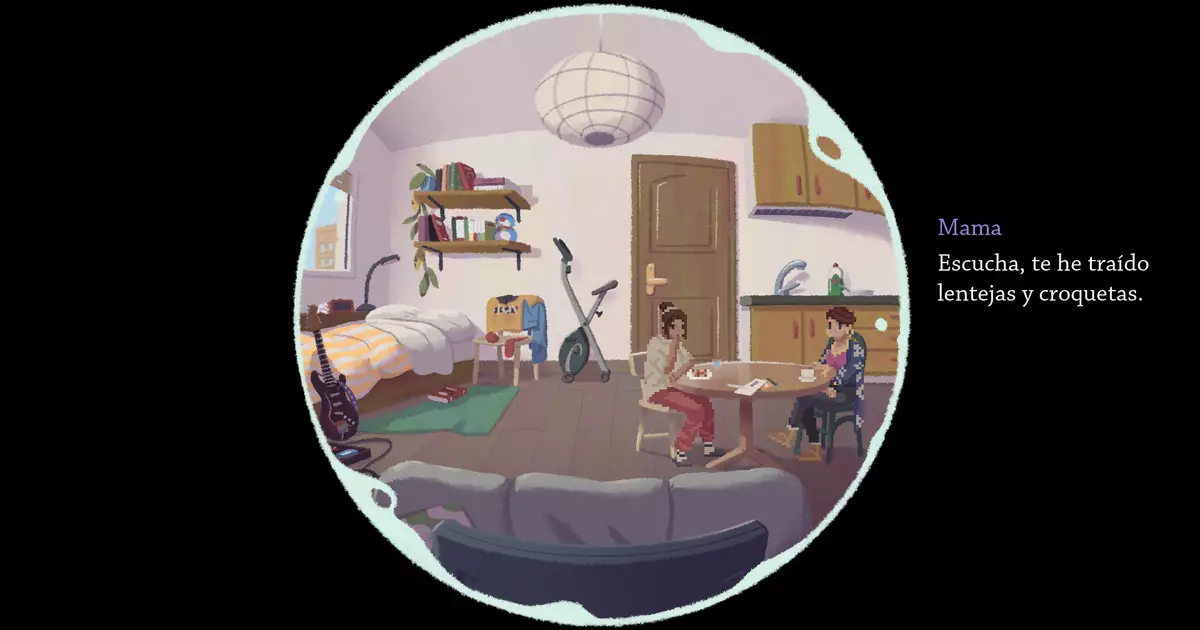In the whirlwind of modern life, the experiences of burnout and emotional exhaustion have become prevalent, particularly in creative and high-pressure fields. Vendrán Las Aves, a poignant gaming experience by Francisco Riolobos, Chuso Montero, and the creative minds at Deconstructeam, emerges as a refreshing take on the theme of mental recovery. Packed within a petite, delicate interface resembling a snow globe, players step into the shoes of a character who has recently unearthed their passion for music amidst the lethargy and weariness of post-employment life. This game doesn’t just serve as entertainment; it offers a delicate reflection on the nuances of recuperation and the slow yet essential process of rebuilding one’s self.
Upon starting the game, players navigate the mundane reality of a one-room apartment, representing a slice of contemporary life marked by isolation and self-reflection. The primary mechanic revolves around resource allocation, where every choice reflects the character’s fragility. The limited points of energy available each day force players to decide how to distribute their time between eating, resting, and engaging in life’s simple pleasures, such as watching television or doing laundry. This allocation creates a compelling tension; not every day will be productive, and the character may often resort to ordering takeout or scrolling through their phone. Importantly, the game’s stark realism is underscored by the reminder that nurturing oneself is not linear, yet the persistent hope for a better tomorrow lingers in each decision.
At first glance, the straightforward premise akin to a “slice of life Tamagotchi” might seem trivial or oversimplified, yet it captures the intricacies of human emotion with unexpected depth. The game’s atmospheric portrayal of burnout resonates on a personal level, embodying that unique cocktail of restlessness, frustration, and fleeting happiness that many experience. Players are encouraged to recognize the subtle virtues that emerge from vulnerability — such as seeking help from loved ones. For instance, when a character’s mother visits with a Tupperware full of nourishing food, it allows the player to reallocate their energy toward more fulfilling pursuits, emphasizing the importance of community and support systems.
Notably, the game subtly critiques the systemic nature of burnout without becoming overtly bleak. Characters’ dialogues hint at a disdain for misleading corporate structures that perpetuate exhaustion while also emphasizing the joy derived from creation and artistry. Vendrán Las Aves presents a nuanced perspective that combines individual struggles with collective societal issues, reminding players that recovery is not merely an internal journey, but often intertwined with external forces.
Beyond Entertainment: Cultural Reflections
This intimate characterization invites players to reflect on their relationship with mental health and the external environments that influence their wellbeing. Comparisons to other narrative games like Zoe Quinn’s Depression Quest emphasize this thematic exploration further, although the childish framing of a Tamagotchi-style game opens up an avenue for critique. The gaming landscape often employs virtual pets as tools for emotional support; however, the realities of fostering genuine relationships occasionally complicate this perception. Such nuances surrounding mental health should be central to discussions about interactive storytelling in gaming.
Ultimately, while Vendrán Las Aves skews toward being a light-hearted take on heavy themes, it manages to convey a heartfelt message about the complexities of mental health and recovery. The subtle yet powerful conclusions found within the game — the idea that healing is a multifaceted journey with no tidy resolution — resonate powerfully. It reminds us of the importance of balance, patience, and community support in navigating life’s tumultuous times. For anyone grappling with burnout or simply seeking a moment of reflection, this game serves as a gentle reminder that tomorrow holds the promise of renewal and perhaps, a few plucked guitar strings. This exploration of emotional recovery encapsulated in a playful format not only captures the spirit of healing but also challenges players to embrace both vulnerability and resilience.


Leave a Reply